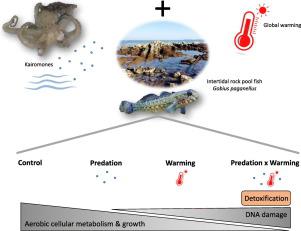Science of the Total Environment ( IF 8.2 ) Pub Date : 2021-02-09 , DOI: 10.1016/j.scitotenv.2021.145736 Nina Paul , Sara C. Novais , Catia S.E. Silva , Susana Mendes , Andreas Kunzmann , Marco F.L. Lemos

|
In nature, a multitude of factors influences the fitness of an organism at a given time, which makes single stressor assessments far from ecologically relevant scenarios. This study focused on the effects of water temperature and predation stress on the metabolism and body mass gain of a common intertidal rock pool fish, Gobius paganellus, addressing the following hypotheses: (1) the energy metabolism of G. paganellus under predation stress is reduced; (2) G. paganellus shows thermal compensation under heat stress; and (3) thermal stress is the dominant stressor that may override predation stress responses. Individuals were exposed to simulated predation stress and temperature increase from 20 °C to 29 °C, and both stressors combined. Physiological effects were addressed using biochemical biomarkers related with energy metabolism (isocitrate dehydrogenase, lactate dehydrogenase, energy available, energy consumption rates), oxidative stress (superoxide dismutase, catalase, DNA damage, lipid peroxidation), and biotransformation (glutathione-S-transferase).
The results of this study revealed that predation stress reduced the cellular metabolism of G. paganellus, and enhanced storage of protein reserves. As hypothesized, hyperthermia decreased the aerobic mitochondrial metabolism, indicating thermal compensation mechanisms to resist against unfavourable temperatures. Hyperthermia was the dominant stressor overriding the physiological responses to predation stress. Both stressors combined might further have synergistically activated detoxification pathways, even though not strong enough to counteract lipid peroxidation and DNA damage completely. The synergistic effect of combined thermal and predation stress thus may not only increase the risk of being preyed upon, but also may indicate extra energy trade-off for the basal metabolism, which in turn may have ecologically relevant consequences for general body functions such as somatic growth and reproduction. The present findings clearly underline the ecological importance of multi-stressor assessments to provide a better and holistic picture of physiological responses towards more realistic evaluations of climate change consequences for intertidal populations.
中文翻译:

全球变暖不考虑潮间带岩塘鱼戈比乌斯·帕格内鲁斯的生理反捕食机制
在自然界中,多种因素会影响生物体在给定时间的适应性,这使得单个应激源评估与生态相关的情景相去甚远。这项研究集中于水温和捕食胁迫对常见潮间带岩塘鱼Gobius paganellus代谢和体重增加的影响,解决了以下假设:(1)减少了捕食胁迫下G. paganellus的能量代谢; (2)帕格氏菌在热应力下显示出热补偿;(3)热应激是最主要的应激源,可能会超越掠夺性应激反应。使个体暴露于模拟的捕食胁迫下,温度从20°C升高至29°C,并且两个应激源都组合在一起。使用与能量代谢(异柠檬酸脱氢酶,乳酸脱氢酶,可利用的能量,能量消耗率),氧化应激(超氧化物歧化酶,过氧化氢酶,DNA损伤,脂质过氧化)和生物转化(谷胱甘肽-S-转移酶)有关的生化生物标记物来解决生理效应。 。
这项研究的结果表明,捕食压力降低了G. paganellus的细胞代谢,并增强蛋白质储备的存储。如假设的那样,热疗降低了有氧线粒体的新陈代谢,表明了抵御不利温度的热补偿机制。热疗是最主要的应激源,它压倒了对捕食应激的生理反应。两种应激源的组合都可能进一步具有协同激活的解毒途径,即使其强度不足以完全抵抗脂质过氧化和DNA损伤。因此,热应激和捕食应激共同产生的协同效应不仅可能增加被捕食的风险,而且可能表明基础代谢需要更多的能量权衡,这反过来可能对诸如躯体的一般身体功能产生与生态相关的后果生长繁殖。











































 京公网安备 11010802027423号
京公网安备 11010802027423号